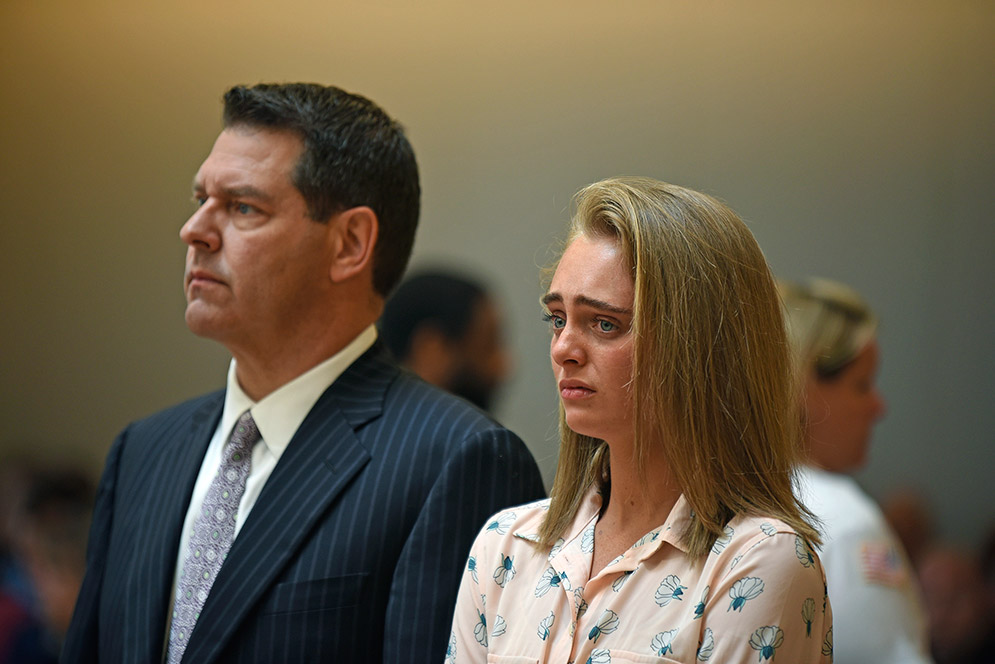Should Teen Who Goaded Boyfriend to Suicide Have Been Convicted?
BU’s David Rossman on guilty verdict that surprised many

Michelle Carter’s urging her boyfriend to kill himself in 2014 was enough for an involuntary manslaughter conviction. Photo by Glenn Silva/AP Images
You’re 17, suffer from mental health problems, and have a boyfriend who is also depressed and has attempted suicide four times. He’s an hour away in a truck filling with carbon monoxide. You’ve goaded him to kill himself with numerous texts, and now, as he has second thoughts and gets out of the truck, you order him back in during a phone call. He complies, and dies. Are you partly responsible?
Stunning many legal experts, a Massachusetts judge last week said yes, finding Michelle Carter of Taunton guilty of involuntary manslaughter in the 2014 death of Conrad Roy III. Lawyers for Carter—who was 17 at the time, suffered from eating disorders and severe insecurities, and had contemplated suicide herself—argued that she’d tried to talk Roy into seeking help until two weeks before his death. Then, under the influence of antidepressants, she became convinced that suicide was his best option, they said.
Carter, who faces up to 20 years in prison, had waived her right to a jury trial, entrusting her fate to Bristol County Juvenile Court Judge Lawrence Moniz. Unlike dozens of other states, Massachusetts doesn’t have a law against encouraging suicide, and Carter was not with Roy at his death—facts that had experts expecting an acquittal, according to the New York Times.

BU Today discussed the case with David Rossman, a School of Law professor of law and director of the Criminal Law Clinical Programs. A working criminal defense lawyer, he teaches criminal procedure, trial practice, and advocacy, as well as criminal justice issues.
BU Today: Did the verdict surprise you?
Rossman: The verdict did not surprise me. There was evidence that Mr. Roy got out of his car and reentered it only after Ms. Carter urged him to do so. If he had stayed out of the car, he would not have died. The judge believed that the evidence showed beyond a reasonable doubt that it was Ms. Carter’s words that were the “proximate cause” of his death—meaning that without her statement, he would have stayed out of the car that became the instrument of his death.
Unlike other states, Massachusetts doesn’t have a law against encouraging suicide. Does that mean Carter’s lawyers have a likelihood of overturning her conviction on appeal?
While there isn’t a specific law dealing with encouraging suicide, the common law of homicide in Massachusetts has for 200 years considered this type of behavior to be a crime. In 1816, the Supreme Judicial Court of Massachusetts, in Commonwealth v. Bowen, established that if you encourage someone to kill himself or herself and your actions are the motivating factor, you are guilty of homicide.
In Bowen, one of two prisoners in the Northampton jail convinced the other to kill himself the day before he was scheduled to be executed. Even though the defendant’s actions only accelerated the victim’s death by one day, the court held that a jury’s verdict of guilty was supported by the evidence and the law. So, by the same logic, it was irrelevant that Mr. Roy may have inevitably killed himself at some future time, if the evidence showed beyond a reasonable doubt that he would not have killed himself on the day in question but for the actions of Ms. Carter.
Should Massachusetts lawmakers criminalize what Carter did?
The current manslaughter doctrine in Massachusetts already serves to criminalize what Ms. Carter did. This type of behavior is, fortunately, fairly uncommon. In the rare occasions when it may come up in the future, judges can shape the common law of homicide to meet unforeseen circumstances. It would be difficult for the legislature to craft a law that would be as flexible as what judges could accomplish.
On the other hand, there is a great deal of benefit in giving people advance warning of what they may and may not do. If socially useful behavior is discouraged by the prospect of prosecution, then a legislative solution can establish clear boundaries. For example, if doctors come to fear prosecution for giving advice about end-of-life decisions by their patients, then the Massachusetts legislature can make clear the limits of the homicide law in this regard.
The prosecution argued that the fact that Carter wasn’t physically with the victim when encouraging his suicide was immaterial, as technology has changed how we interact with one another. Does the law need to catch up with technology and recognize more online activities as criminal?
The law is slowly recognizing the ways long-standing doctrine has to change to meet technology. We see this in procedural limits on the police—for example, in the types of searches they may and may not conduct on cell phones without a warrant. And we are seeing this in the substantive criminal law also, as in this case, where the acts that lead to liability had their effect over a means that the judges who decided the Bowen case could not have imagined.
Some experts have speculated that the judge found her guilty in part as a message to state lawmakers to hold people to account for how they behave online. Do you agree?
It would be improper for a judge, or a jury, to consider as a factor in deciding a criminal case anything but how the law applies to the facts admitted into evidence. I hope the judge did not try to “send a message,” but instead did his best to evaluate the evidence against his understanding of the controlling legal principles.
Comments & Discussion
Boston University moderates comments to facilitate an informed, substantive, civil conversation. Abusive, profane, self-promotional, misleading, incoherent or off-topic comments will be rejected. Moderators are staffed during regular business hours (EST) and can only accept comments written in English. Statistics or facts must include a citation or a link to the citation.